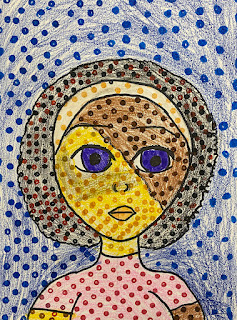Radial Symmetry Relief Printmaking in 5th grade
On day one of the lesson, students painted a 12" x 12" piece of multi-media paper with liquid watercolors. I use Blick liquid watercolors and water them down a bit. They were encouraged to make a radial painting.
On the second day, students carved their image on a foam sheet. I cut squares of foam sheets into 6" squares for each student. I purchased mine after Christmas for 90% off at Michaels! Students divided their sheet into curved sections with one corner being a small half circle to create their radial design. Students could use an ink pen, wood stylus, or dull colored pencil to carve their designs.
I love gelli plates for printmaking. They create a nice flat surface for the children. I purchased mine with a grant. Don't forget to have them draw an arrow on the corner they want to be in the middle!
Once they carved their design, the printmaking part went pretty quickly. My students had so much fun with this!




























































